
Anarea > Systems > MU > GODS: the Art of Clericism
3rd edition (2025: effective 21 I 2506)
past systems changes noted in italics with dates


1.1 The Cleric ("Cl") uses the magic of Gods.
1.2 To do so, they must first put Faith ("Ft") in a Clerical God (or in a False God Sponsored by a Clerical God) Who has accepted that Faith. They then make a Clerical Request of that God, by Casting a Clerical Spell.
1.3 The God then decides whether, and how, to grant that Request. That decision may be influenced by the Cl’s standing with the God, as represented by their Base Chance of Success ("B") and Clerical Credit ("cr").
2.1 Any Being (a "Follower"), whether or not they are a Cl, can put their Ft in anyone, anything or any concept. It can only be allocated in whole points of Ft, but can be split between several Gods (or whatever) and/or withheld. The Follower must put their Faith in sincerely for a Higher Power to be aware of it. If it is not entirely sincere, it may only reach the Higher Power at a reduced level. A Follower may have Ft in more than one God, although this is inefficient for being a Cl of any such God.
2.2 Gods and other Higher Powers are aware of the Ft put in Them, and may decide whether to accept or reject it. Accepted Ft gives Gods knowledge (Their chance of knowing what a follower is doing or thinking = (Accepted Ft) * 5%) and power. Higher Powers may be unwilling to accept Faith from Followers of different Alignments, or who also have Ft in Their rivals, even if put in Them sincerely.
2.3 Accepted Ft gives Higher Powers knowledge (Their chance of knowing what a Follower is doing or thinking = (Accepted Ft) * 5%) and power.
3.1 Clerical Gods
Only certain Gods are known to be Clerical; i.e. to grant the Clerical Requests of Their Clerical Followers ("Clerical Gods"). Those Gods are (or were):
|
God (link to Standard Spell List) |
Symbol |
Alignment |
Clerical Aspect |
Dates Clerical |
CWA Renewal Time (OW time) |
Usual B (past – 13 IX 2501 to 5 XIII 2503 - 6 XIII 2503 to date) |
 |
E/N |
Evil |
always |
Midday 07.00 |
60 - 65 - 60% |
|
 |
G/L |
Creation |
from c1200 to 24 XIII 2500 |
Midnight 2.3.00 |
55 - 0% |
|
 |
N/L |
The Sun |
from 24 XIII 2501 (just in the Kayani Nation before then) |
Sunrise 01.00 (in OW or UW) |
0 - 55 - 50% |
|
 |
N/C |
Chaos |
always |
Random time during Caeriad for each Cl! |
60 – 55 - 60% |
|
 |
G/N |
Good |
always |
Fixed by Cl in Commune |
65 – 55 - 60% |
|
 |
G/L |
Peace |
from c1500 |
Midnight 2.3.00 |
40 – 60 - 55% |
|
 |
E/N |
Hate |
from c100 |
Midday 07.00 |
40 – 50 - 50% |
|
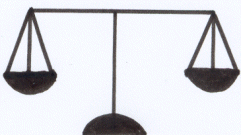 |
N/N |
Neutrality |
always |
Sunrise 01.00 |
70 - 70 - 65% |
|
 |
E/L |
Destruction |
from c700 to 2297 and from IX 2501 |
Sunset 1.1.00 |
50 – 0 - 40% |
|
 |
N/C |
The Moon |
from at least 700 |
Sunset 1.1.00 (in OW or UW) |
45% (but varies by Phase of Moon - see Spell List) |
|
 |
G/C |
Hope |
from 8 VI 2501 |
Midnight 2.3.00 |
0 – 45 - 50% |
|
 |
G/C |
Fertility |
from c700 to 7 VI 2501 |
on morning prayer |
40 – 0% |
|
 |
G/L |
Music |
from c1600 |
on Cl’s 1st song of Cd |
25 – 35% |
|
 |
N/N |
Evening Star |
from c700 |
Midnight 2.3.00 (in OW or UW) |
35% |
|
 |
N/L |
Law |
always |
Sunrise 01.00 |
70 – 60 - 65% |
|
 |
G/N |
Love |
from c100 |
Sunrise 01.00 |
40 – 50 - 55% |
|
 |
N/L |
Undead |
from c1200 to 24 XIII 2501 (but still grants Clerical Spells despite now being Undead) |
Sunset 1.1.00 |
50 – 0% |
|
 |
E/C |
Waste |
from c1200 |
on Cl’s 1st blood sacrifice after Sunset (in OW or UW) |
50 – 60 - 65% |
|
 |
G/C |
Luck |
from 8 VI 2501 |
Midnight 2.3.00 |
0 – 45 - 50% |
|
 |
G/L |
Harmony |
from 24 XIII 2501 |
Midnight 2.3.00 |
0 – 30 - 35% |
|
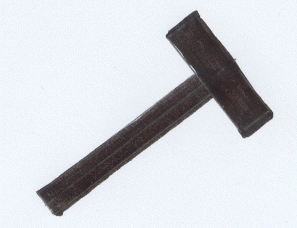 |
E/L |
Destruction |
from 2297 |
Sunset 1.1.00 |
0 - 45 – 65 - 60% |
|
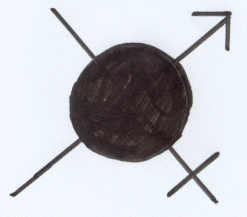 |
E/C |
War |
from c1200 |
Sunrise 01.00 |
50 – 55 - 60% |
3.2.1 Many other Gods or Higher Powers Who have Faithful Followers are competing to become Clerical Gods ("False Gods"). Their Followers have even established Temples to them, in order to worship Them and recruit more Followers to Their Cause. Such Temples are often found on the Streets of False Gods in many cities or towns, but can be located elsewhere. The Followers of False Gods believe that if Their God attracts sufficent Faithful Followers, They will become a Clerical God (or the more fanatical believe the False God is already a Clerical God and this is being denied by blasphemers and heretics). It is also believed that if a Clerical God loses sufficient Faithful Followers, They will cease to be Clerical.
3.2.2 The position here is complicated because some False Gods have Clerics who can Cast effective Clerical Spells. This is because they are granted by a true Clerical God (the "Sponsor"), which They may do for a number of reasons:
the False God is a member of Their Host who has put Their Faith in the Sponsor, thus transferring some or all of the power given by Their Followers to the Sponsor;
the False God has reached an agreement for the Sponsor to grant Clerical Spells on Their behalf in consideration of a transfer of some or all of the power given by Their Followers to the Sponsor and/or other payment;
it amuses or suits the Sponsor to do so (because They are Chaotic or to further Their plans); and/or
the False God is merely another Aspect of the Clerical God (e.g. ESCUS is worshipped by some Wolf Cults as THE GREAT WHITE WOLF ESCUS).
3.2.3 The False Gods Who are known to grant Clerical Requests (Themselves or by a Sponsor Clerical God) are as follows. Note that some False Gods have the same Aspect, in particular where Cultist Clerics are of different Alignments. Some current Clerical Gods may previously have been False Gods with Their Clerical Requests granted by the senior Clerical God of Their Alignment.
| False God | Alignment | Aspect | Sponsor | Notes |
| BARRL | E/N | Malevolence | HAERIM | |
| DAELOTH | E/C | Terror | TERRIK | |
| GANCHA | N/N | Elephants | KOROS | SARAN for N/L Elephant Cults |
| HALCYON | G/C | Daydreams | OPSOR | |
| HALKI | E/N | Thieves | HALKI | Not actually Clerical, but His Clerics use Thievery to appear to Cast Clerical Spells. |
| HANDAMAN | G/C or E/C | Monkeys | TIPRE | or TERRIK for Dark Monkey Cults |
| JAKK/THE RED COYOTE | E/N | Wickedness, the Trickster | ALTIS | |
| JAPAL | N/N | Mammals | KOROS | |
| KAROK | N/N | Crocodiles | KOROS | |
| KASHAT | E/C | Nightmares | TERRIK | |
| LAMMIA | G/C | Delirium | TIPRE | |
| LIAKA | E/L | Viciousness | WAGREN | |
| LLYWELLA | N/N | Fishes, Merfolk | KOROS | |
| MELLIA | G/C | Fancy | OPSOR | |
| MERLO | N/C | Dreams | DALA | |
| MORCOR | E/C | Despair | TERRIK | |
| NORRID | N/N | Trees | KOROS | |
| ORORO | N/C | Imagination | DALA | |
| OUROBOROS | N/N | Saurians | KOROS | OUROBOROS is actually E/N, but only just E. |
| OUROBOROS (Dark Side) | E/N | Saurians | HAERIM | |
| PHANTOM | E/L | Ghosts | SOROK | |
| QUAYAG | N/N | Organisms | KOROS | |
| RABBAT | N/C | Delusion | MIRIMI | |
| RATTUS | E/L | Rats | WAGREN | |
| RAVAR | unaligned | Change | RAVAR | Not actually Clerical, but His Apostles and Disciples use Changing to appear to Cast Clerical Spells. |
| SIMBA | N/C | Cats | WAGREN | |
| SNARF | E/C | Boars | TERRIK | |
| SKARZ | E/N | Scorpions | HAERIM | |
| SORONVAL | N/N | Eagles | KOROS | |
| STRAMMASCH | E/C | Violence | TERRIK | |
| SURGAT | N/L | Prophecy | SARAN | |
| THE DARK BAT | E/N | Bats | ALTIS | |
| THE GREAT BEAR ESCUS | G/N | Bears | ESCUS | |
| THE GREAT BLACK BULL | E/N | Cattle | ALTIS | |
| THE GREAT BLACK GORILLA | E/C | Monkeys | TERRIK | God of Dark Gorilla Cults |
| THE GREAT BLACK CROCODILE | E/N | Crocodiles | ALTIS | God of Dark Crocodile Cults |
| THE GREAT BLACK WOLF ALTIS | E/N | Wolves | ALTIS | God of Dark Wolf Cults |
| THE GREAT BOAR ESCUS | G/N | Boars | ESCUS | |
| THE GREAT GOLDEN HEIFER | N/L | Cattle | SARAN | |
| THE GREAT SOW IN THE MOON | N/C | Boars | MIRIMI | |
| THE GREAT WHITE BEAR | G/N | Bears | ESCUS | |
| THE GREAT WHITE BULL / BUFFALO | G/N or N/L | Cattle, Buffalos, Bison | ESCUS | or SARAN for N/L Cattle Cults |
| THE GREAT WHITE COYOTE | G/N | Coyotes | ESCUS | |
| THE GREAT WHITE WOLF | G/N | Wolves | ESCUS | |
| THE GREAT WISE OWL | N/N | Owls, Wisdom | KOROS | |
| THE HORNED RIDER | E/C | Trouble | TERRIK | a.k.a. CORNUTUR |
| THE RED SCORPION | E/N | Hate, Scorpions | HAERIM | The Red Scorpions are a schismatic sect of HAERIM. |
| THE WALKER IN THE FOREST | N/N | Forests & Tree Kingdoms | KOROS | |
| THE WHITE STAG | G/L | Deer | WACON | |
| UFFEH | N/N | Clouds, Ravens, Herons, Seagulls | KOROS | |
| ULULO | N/C | Mania | DALA | |
| UMBOR | N/N | Plants | KOROS | |
| UNGOL | E/L | Spiders | LOFIR | |
| URIEL | E/N | Shadows | ALTIS | |
| URSO | G/C | Bears | OPSOR | |
| VIXEW | N/N | Reptiles | KOROS | |
| VULTURO | E/C | Vultures, Scavengers | TERRIK | |
| XAXIX | N/N | Insects | KOROS | |
| XSARA | N/C | Snakes | DALA | |
| YELLIP | N/N | Birds | KOROS | |
| YSSA | E/C | Serpents | TERRIK | |
| YWHRC | E/C | Madness | TERRIK |
3.2.4 HALKI and RAVAR are not actually Clerical, although Their Followers may profess that They are. See the Thief and Changing Systems respectively for how Their "Spells" are performed.
3.2.5 Each False God has Their own Clerical Spell List, which will be a version of Their Sponsor's Standard Spell List with some Spell names and/or Non-Standard Spells appropriate to Their Aspect. Where not specifically defined use the Sponsor's Standard Clerical Spell List (see 3.1 above).
3.2.6 The CWA Renewal Time of a False God is the same as that of Their Sponsor, excpet as may be specified otherwise in a Spell List or by the DM.
3.2.7 The Usual B of a False God depends upon the Ft put by Followers in Them and in Their Sponsor. Where not specifically defined use the Sponsor's Usual B (see 3.1 above) less 10% (unless the False God is an Aspect of the Clerical God), or as the DM may rule.
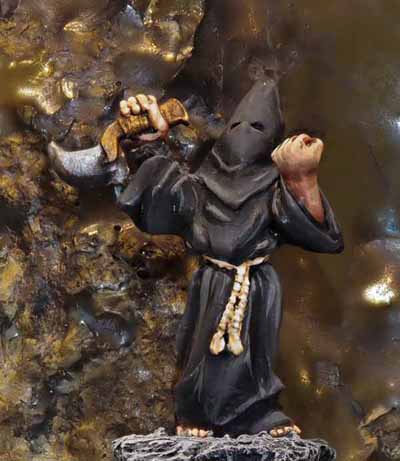
4.1 ClL is the basic measure of a Cl’s proficiency at Clerical Magic-Using.
4.2 Non-Cls have ClL 0.
4.3 ClL 1 is gained by completing Clerical Initial Basic Training ("IBT").
4.4 ClL above 1 is gained by earning Clerical Experience. Continuous Level Advancement ("CLA") applies, in that the exact ClL (usually expressed to 4 decimal places) is used in all calculations involving ClL.
Wishes are a measure of the current level of support a Cl may expect from their God. They are calculated in two ways: CWA and cr. Separate totals for both are calculated for each Clerical God Who has accepted Ft from the Cl.
5.1.1 CWA is the number of wishes the God grants to the Cl for use each Caeriad, calculated as follows (FRD):
CWA = (ClL(ClL+1)/2) + ClL + (Ft Accepted by God) - 11 wishes
CWA is never less than 0.
5.1.2 CWA is renewed in full each Cd, at the CWA Renewal Time specified for the God in the table at 3.1 above. Wishes not used during the Cd are lost. If the Cl’s CWA changes during the Cd (e.g. due to Clerical Experience or a change in Ft), the revised CWA does not take effect until the next renewal.
5.2.1 Credit is the Cl’s current standing with their God, expressed as the number of wishes into which it may be converted.
5.2.2 Cr is gained by behaviour of which the God approves, and lost by behaviour of which the God disapproves (This depends upon the God’s Alignment and Aspect.). There is no maximum amount of cr that may be accumulated, and it is not lost with time (though failure to keep earning it may count as behaviour of which the God disapproves).
5.2.3 The Cl may go negative on cr (into Debit ("dr"), either by the God allowing them to expend more cr than they have, or by inappropriate behaviour.
5.2.4 Cr or dr is awarded by the DM, though the Creeds of the more Lawful Gods may contain published tables of the cr awarded for particular activities or the dr incurred as penance for various sins. As a rough guide the following awards would be typical:
| Cr gained | Activity |
|
+1 |
prayer |
|
+10 |
"good" deed |
|
+(Ft * Level) |
conversion of a new Follower |
|
+100 |
major advancement of God’s cause |
|
-1 |
slip of the tongue |
|
-10 |
"sin" |
|
up to -500 |
Final Appeal (God saves Cl from death) |
5.2.5 Cr or dr may also be awarded to non-Cls. However, the God must be aware of their actions. It would be unusual for a God to award cr or dr to someone with no Ft in Them. Faithful non-Clerical followers of a God who have significantly advanced their God’s cause may in this way earn enough cr for a Final Appeal.
5.2.6 A Cl (or non-Cl present) may ask their current cr in a Commune.
B is the base percentage chance that the God will grant a Clerical Request, calculated as follows.
Maximum B = 5 * (Ft Accepted by God) %
The Cl’s B may never exceed their Maximum B, subject to bonuses or minuses for sanctified ground or (for MIRIMI Clerics only) Phase of the Moon.
6.2.1 The Usual B for each God is specified in the table at 3.1 above, subject to 3.2.7 above for False Gods. This is the average B the God grants to Their Cls.
6.2.2 Usual B depends on the Godís Clerical power, and may be increased or decreased from time to time (in multiples of 5%), depending on how Clerically active the God and Their Followers are. The more Ft there is in the God, the higher Their Usual B, but the more They are granting Requests, the lower the Usual B They can give to all Their Cls. Gods may also increase Their Usual B at crucial times for the advancement of Their causes, and reduce it at quieter times.
6.2.3 MIRIMI's Usual B, and therefore the B of Her Clerics, also varies by the Phase of the Moon, as stated in Her Spell List.)
6.2.4 A Cl may ask their God’s current Usual B in a Commune.
6.3 Cleric's B
Subject to the other factors specified in this section 6., the Cl’s B will be equal to the God’s Usual B.
A Cl may ask their current B in a Commune.
For each 100 cr or dr (FRD) the Cl has, they take + or - 5% respectively to their B.
The God may override this rule at Their discretion, to ignore short-term fluctuations. B reflects the Cl's longer-term standing with their God, and so (for example) the God may allow the Cl to earn back the cr lost before reducing their B.
6.3.2.1 If the Cl is not fluent in the God’s Alignment Tongue (in which Clerical Requests are made), multiply B by:
(LP in Tongue) / (LP required for K+F)
6.3.2.2 If the Request is being read (e.g. from a Scroll), multiply B by:
(LP in Tongue) / (LP required for K+F+R)
6.5.1.1 If a Request is made on Ground Sanctified / Consecrated / Desecrated to the God to Whom it is made, add the bonus for that Ground to B.
6.5.1.2 If the Request is made on Ground Sanctified / Consecrated / Desecrated to another God, deduct half the bonus for that Ground from B per point of Alignment difference. The minus for Ground Sanctified to another God is therefore 0, 0.5, 1, 1.5 or 2 times its bonus. E.g 5% FIDAR Consecrated Ground gives +5% to FIDAR Cls, +0% to PAREL Cls, -2.5% to ESCUS or SARAN Cls, -5% to WAGREN, TIPRE or KOROS Cls, -7.5% to DALA or ALTIS Cls, or –10% to ZAKEL Cls.
6.5.1.3 A Cl may ask the Sanctification of their current location in Commune.
7.1 Clerical Spells are graded by Spell Level ("SL"), and must be learnt before they can be Cast (except that Spells which have not been learnt may be cast by Credit Request).
7.2 Each God has a standard Clerical Spell List. Any Spell on this list may be learnt from Scrolls available to the God’s Cls from Their major Temples (though not necessarily freely). The SL at which a particular God grants a particular Spell, or even grants it at all, depends on Their Alignment and Aspect. KOROS, being Neutral/Neutral, grants most Spells at their average level, except in relation to the Undead. A Clerical Spell once learnt may be Requested of any God Who grants it, without relearning it for a different God.
7.3 Cls may Commune to be granted non-standard Spells. There is a one-off cost in cr for this, depending on the God's view of the Cl, the unusualness of the Spell and its appropriateness to the God's Creed (but as a guideline assume 10Cr/SL). Non-standard Spells are normally recorded on a scroll, but other Cls of the God must be granted permission by Commune (and pay the cr) to be granted the Spell as well.
7.4 The typical Usual Learning Time ("ULT") of a straightforward Clerical Spell is 5 hours, irrespective of its Spell Level. The ULTs for specific Clerical Spells are stated in their respective Spell Specifications.
7.5 Each Clerical Spell learnt counts as ½ a Spell Learning Level ("SLL"), irrespective of its Spell Level. Overlearnt Spell Levels give a penalty of –5% to % chance for each 2 SLL overlearnt (FRU).
7.6 Some Clerical Spells have variable Spell Levels, depending on the effect requested. But so long as they are specified as one Spell in the Clerical Spell List, they count as one Spell for learning purposes. Additional ULT may be required for different versions of the same Spell, e.g. if a different God grants the Spell in another version.
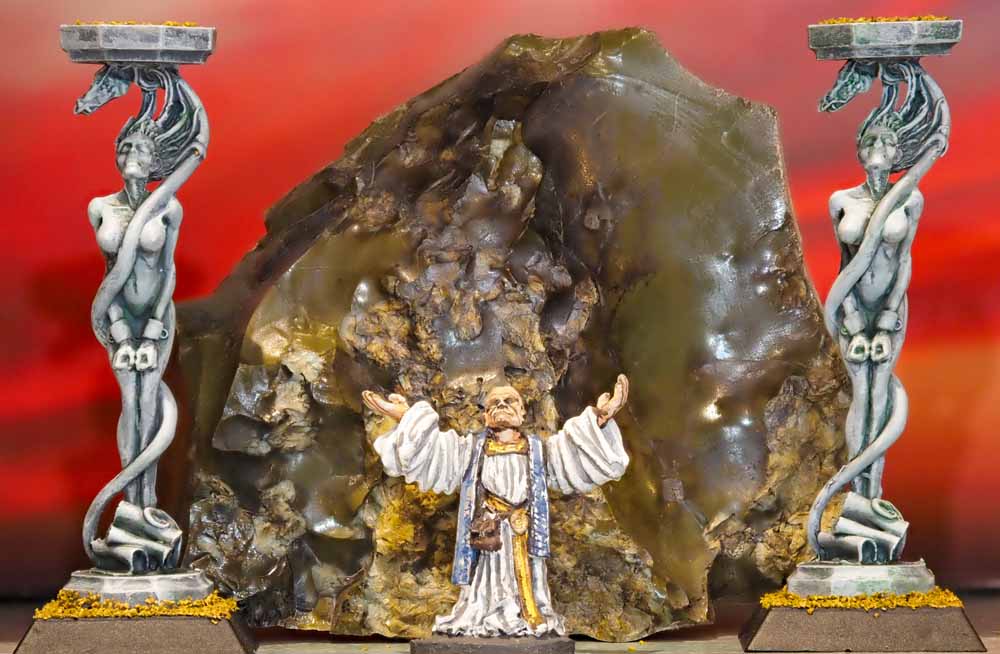
A Clerical Spell is Cast by Incantation, Actions and Materials and powered by wishes and Spell Points ("SP") to Request the God in which the Cl has Ft to produce the desired Effect.
8.1.1 The % chance of a Clerical Request being granted by the God is:
% chance = (B * (ClL/SL) * ((Wishes used)/SL) * ((SP used)/(SP required))) – (5*IST)
8.1.2 Note that % chance may be > 100. The amount by which % chance is > 100 adds to the Throw obtained on the Spell. However a roll of 100 always fails, so the chance of a Request being granted is never > 99%.
8.1.3 % chance is never FRU or FRD, and may be expressed to any number of decimal places (Gods can easily cope with such calculations!).
8.2.1 The Request must be clearly incanted in the God’s Alignment Tongue, taking:
8.2.2 If Prayer is used to put in extra wishes, this follows as part of the casting time.
8.2.3 Word Spells take 1 second, but additional time is still required to name each other participant in a Joint Request or for Prayer. The other factors are covered by inflection of the Word. Word Spells are specified as such in their Spell Specifications. Non-Word Spells may be Cast as a Word Spell in 1 second for a cost in cr, as below.
8.2.4 Casting time may be reduced and/or the incantation not clearly declaimed, provided it is necessary in the circumstances and at a cost in cr. Typically it costs:
If the God does not consider the reduction in casting time to have been absolutely necessary, They may deduct additional cr and/or apply a ratio to % chance of (Casting time taken)/(Casting time God requires).
8.3.1 Most Spell Specifications require certain Actions and/or Materials.
8.3.2 In some cases they are absolutely necessary, and the Spell cannot therefore be Cast without them (e.g. Sticks to Snakes requires at least one stick).
8.3.3 Otherwise they may be dispensed with, provided it is necessary in the circumstances and at a cost in cr. Typically it costs -10 cr to dispense with an action or material. If the God does not consider the dispensation to have been absolutely necessary, They may deduct additional cr and/or apply a ratio to % chance (which may well reduce it to zero). Failure to have the right Materials to hand because one has not prepared for the Casting of the Spell is unlikely to be considered a necessary dispensation by Lawful Gods. Chaotic ones may be impressed by the improvisation of alternative Materials.
Up to SL wishes may be used from CWA. When CWA is expended, they may be used from cr (if available) and/or from wish-storing Magic Items (if available).
Extra wishes in excess of SL may be put in out of cr and/or by Prayer and/or from wish-storing Magic Items as follows.
Extra wishes may be put in out of cr (if available) as follows:
n extra wishes cost (n+1)(n+2)/2 cr i.e.
| cr | 3 | 6 | 10 | 15 | 21 | 28 | 36 | 45 | 55 | 66 | 78 | 91 | 105 | 120 | 136 | 153 | etc. |
| extra wishes | 1 | 2 | 3 | 4 | 5 | 6 | 7 | 8 | 9 | 10 | 11 | 12 | 13 | 14 | 15 | 16 | etc. |
Prior to 1 VIII 2500, n extra wishes cost only 2n cr.
8.4.2.1 Extra wishes may also be put in by Prayer. The wishes put in by Prayer may be taken from CWA. When CWA is expended, they may be taken from cr (if available) or from wish-storing Magic Items (if available). To apply the nth extra wish by Prayer, the Cl must pray to the God for n minutes, in addition to the Incantation and to any Prayer already offered, and 1 extra wish is gained by Prayer for each 2 wishes applied, as shown by the Prayer table:
|
h |
0 |
0 |
0 |
0 |
0 |
0 |
0 |
0 |
0 |
0 |
1 |
1 |
1 |
1 |
2 |
2 |
|
|
m |
1 |
3 |
6 |
10 |
15 |
21 |
28 |
36 |
45 |
55 |
6 |
18 |
31 |
45 |
0 |
16 |
|
|
a |
1 |
2 |
3 |
4 |
5 |
6 |
7 |
8 |
9 |
10 |
11 |
12 |
13 |
14 |
15 |
16 |
|
|
g |
0 |
1 |
1 |
2 |
2 |
3 |
3 |
4 |
4 |
5 |
5 |
6 |
6 |
7 |
7 |
8 |
|
|
h |
2 |
2 |
3 |
3 |
3 |
4 |
4 |
5 |
5 |
5 |
6 |
6 |
7 |
7 |
8 |
8 |
etc. |
|
m |
33 |
51 |
10 |
30 |
51 |
13 |
36 |
0 |
25 |
51 |
18 |
46 |
15 |
45 |
16 |
48 |
|
|
a |
17 |
18 |
19 |
20 |
21 |
22 |
23 |
24 |
25 |
26 |
27 |
28 |
29 |
30 |
31 |
32 |
etc. |
|
g |
8 |
9 |
9 |
10 |
10 |
11 |
11 |
12 |
12 |
13 |
13 |
14 |
14 |
15 |
15 |
16 |
Where h = hours / m = minutes / a = wishes applied / g = extra wishes gained
8.4.2.2 Prayer extending over the normal CWA Renewal Time postpones CWA Renewal Time until after Casting.
8.4.2.3 If Prayer lasts less time than required for the extra wishes specified in Incantation, the remainder are put in out of cr (if available). If Prayer lasts more time than required for the extra wishes specified in Incantation, the Request is resolved once the specified extra wishes have been Prayed for, and further Prayer is just taken by the God as the thanks which is due.
Extra wishes may also be put in from wish-storing Magic Items (if available). Such wishes are put in on a 1 for 1 basis, having already been discounted in the storing process.
8.5.1 As with all Magic-Using, Spell Points are expended by effort rather than by Incantation.
SP Required = SL/2 (FRU)
Prior to 2 XII 2501 SP Required = SL.
8.5.2 SP used in excess of SP required have no effect on % chance, but do count for IST.
8.5.3 Where the Cl does not know the SL (e.g. in a Credit Request) they must estimate the SP they expend. Underestimation may reduce the chance of success or cost more cr to achieve success. The DM may determine the SP expended on reflex Requests.
Each second of outstanding IST gives -5% to % chance.
8.7.1 The variable parameters of each Spell are listed in its Specification. Except where specified otherwise, the minuses for varying parameters are applied to % chance and are are not applied to Throw.
8.7.2 FRU on all variable parameters: e.g if the Range parameter is:
10d ft - 5 d(d+1)/2 %
to cast the Spell with a 25 ft range, d = 3, giving -30% to % chance.
8.8.1 When % chance has been determined as above, the DM rolls d100 to determine whether the Request is granted by the God and if so what is the Effect.
Spell Roll ("R") = d100 (no RUD)
Spell Throw ("T") = R + (% chance - 100, if +ve)
8.8.2 T may never exceed 500 less all minuses deducted from % chance. NB This is a return to the way the 1st edition of the Clerical System was played. Under the 2nd edition up to 26 Oscow / Day 177 2503, minuses were deducted only from % chance and did not reduce the maximum possible T.
8.8.3 See the Specification for the Spell for the Effect of T.
8.8.4 To compare the power of a Clerical Spell with that of a Druidic or Elementalist Spell, divide T by 5 (FRU).
8.9.1 If a Spell has been Refused to a Cleric, the God will not Grant it to them again until after their next CWA Renewal Time.
8.9.2 If a Spell is Refused and R < = (25 - (Ft Accepted by God)), the God will punish the Cl for their presumption with a Blowback effect of a reversal of the Spell’s effect, with T at the God’s discretion.
8.9.3 If a Spell has failed against a particular target (e.g. the target has saved against Hold Person), the God may be expected to exercise Their discretion to Refuse a second Request for the same Spell against the same target before the next CWA Renewal Time. NB This was effectively a systems change from 1 V 2503.
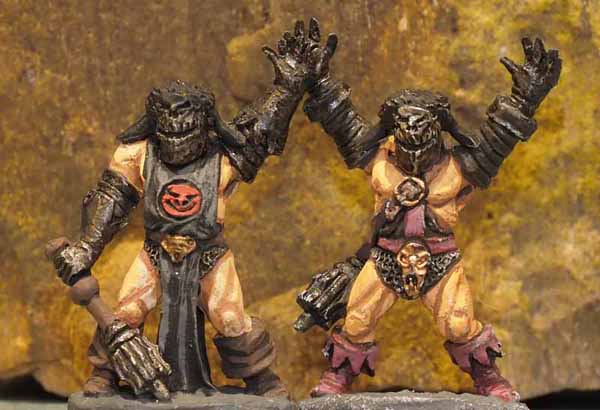
Any number of Cls ("Participants") may jointly Request a Spell of the same God by simultaneous Incantation, as follows. Each participant must name each other Participant in their Incantation. Only those whose lists of Participants (including themselves) all include each other count as making the same Joint Request. Anyone so excluded counts as making a separate Request.
The ClL of the Participants in a Joint Request is the square root of the sum of the squares of the ClLs of all Participants, i.e.:
ClL = Ö (A2 + B2 + C2) for Cls of ClL A, B & C
This is only for calculating % chance of the Joint Request, and does not affect the Participants' respective CWA, SP or SLL.
The B of the Participants in a Joint Request is the average of the Bs of all Participants. Any Sanctified Ground modifier is applied to the joint B after averaging.
No more wishes are required for a Joint Request than would be put in by a single Cl. The total wishes put into a Joint Request may be contributed by the Participants in any proportions, provided each Participant puts in at least 1 wish. Anyone who fails to put in at least 1 wish is excluded from the Request. Each Participant states in their Incantation the number of wishes they personally are putting in. If extra wishes are put in by Prayer, all Participants must pray for the same time as it would take a single Cl to pray in the total number of extra wishes put in by Prayer. Where Prayer and credit are combined, it may be necessary during the Incantation and Prayer to specify exactly who is contributing which wishes, including those lost in putting in extra by Prayer or credit, failing which the God will decide.
All Participants in a Joint Request must individually expend the full SP cost for the Spell Requested. The ((SP used)/(SP required)) ratio is applied separately to % chance for each Participant who fails to expend the full cost.
Prior to 2 XII 2501, the SP cost could be shared, subject to a minimum of 1SP per Participant, as for wishes.
The outstanding IST of all Participants has a cumulative effect on % chance. E.g. if Cl A has 5 sec IST, Cl B has 2 sec IST and Cl C has 0 sec IST, they take 7 sec IST, and therefore take -35% to % chance.
If a Jointly Requested Clerical Spell is Extended, all Participants must expend the full number of SP. However, it is open to any Participant to "drop out" at any time, without affecting the Throw, in which case they do not have to expend SP on Extensions, but no longer have the option to assist in doing so. A Participant who drops out will cease to benefit from any continuing Effect.
10.1 All Gods have a Counterspell and a Word Counterspell on Their standard Clerical Spell Lists. With effect from 1 II 2506 Reflex Conterseplls are also available.
10.2 These are Pure Counterspells of variable level, the level being set in naming the Spell in Incantation (NB It was previously by the number of SP expended, but this no longer worked after the SP cost of Clerical Spells was halved on 2 XII 2501.).
10.3 Counterspells may not be cast using Prayer (as this could postpone incoming Spell effects indefinitely), so extra wishes may only be put in from cr or wish-storing Magic Items.
10.4 Counterspells may be Jointly Requested, protecting all Participants.
10.5 The Subtraction Effect of a Clerical Counterspell is T/2 (FRU).
10.6 The Protection Period of a Clerical Counterspell cannot be Extended.
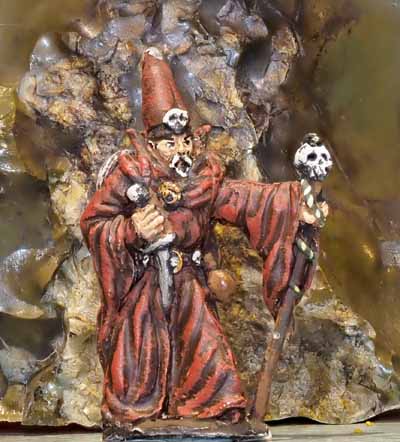
11.1 Clerics may obtain Magic Items from their God at a cost in cr (never dr) by asking for them as a Commune Question. The cost is at the God’s discretion, and will be advised as a separate Commune Question, but the minimum cost for a Magic Item is 100 cr.
11.2 Wish-storing Magic Items have a maximum capacity of wishes that may be stored. An Item which stores n wishes typically costs:
100 + (n(n-1)/2) cr.
Wish-storing Magic Items are charged by Prayer. To charge the nth extra wish by Prayer, the Cl must pray for n minutes, in addition to any Prayer already offered (praying for that same time again without expending wishes if the previous wishes were charged in an earlier session), and 1 extra wish is charged by Prayer for each 2 wishes applied, as shown by the Prayer table above. Stored wishes discharge at the rate of 1 wish per CWA Renewal Time. Stored wishes are not transferable, and must be expended by the Cl who prayed them in. If a different Cl prays wishes into an Item, all previous wishes stored are discharged. Wish-storing Items are specific to the God Who granted them, but are not usually personal to the Cl to whom they were granted (i.e. personal Items do not cost less cr).
11.3 Note that the Item will not usually appear magically. For standard Items such as Wish-storing Rings, the Cleric must produce their own ring to be Enchanted by the God in Commune. For example a gold ring (expected by SARAN) typically costs a minimum of 2GP plus any (optional) gem set on it (for which see the Jeweller). Particularly special Items may be Teleported in by the God, but it would be more usual for the God to send the Cleric on a Quest to find them, and so prove themself worthy of the Item. Chaotic Gods may require random objects to be produced for Enchantment or may hide the Item somewhere and give a cryptic clue where it may be found.
12.1 Any Cl who Reads their Alignment Tongue may write a Scroll by writing down the Incantation for a Request, Incanting and Praying for it normally, and specifying that it is a Scroll (1 sec extra Incantation). The SP and wishes cost is as normal, but there is an additional cr cost equal to the total wishes expended (including those lost in putting in extra wishes). The wishes put into the Scroll are stored as in a Wish-storing Item, and discharge at the rate of 1 wish per CWA Renewal Time.
12.2 The Cl who wrote the Scroll may cast the Spell at any time by reading the Scroll with clear declamation and paying the SP cost again. No wishes may be put in, other than those stored in the Scroll. Casting time may not be reduced, and Word Spells read from a Scroll take the full casting time of a non-Word Spell. Variable parameters are set as they were written. Any target may be specified on casting. The Request is then resolved as normal. Sanctified Ground modifiers are determined by the place of casting, not the place of writing.
12.3 Scrolls are not transferable. Scrolls may be written by Joint Request, but all Participants must cast the Spell, reading it in unison.

13.1 Clerical Gods require Temples to be built to them wherever there are sufficient Followers to worship them. Building Temples is rewarded with cr and Sanctifying / Consecrating / Desecrating them gives a bonus to B for Spells Requested there. Temples serve as a base for the God's Clerics to preach the God's Creed and carry out credit-worthy activities. They also serve to boost the God's Clerical power by reinforcing the Faith of the congregation in the God.
13.2 False Gods also have Temples to increase Their chances of becoming fully Clerical and for Their other purposes, as per 3.2.1 above.
13.3 Depending on the Alignment and Creed of the God, Their Hierarchy may be more or less formalised. Villages and smaller towns will just have the one Temple to each God worshipped locally, run by a single Priest. A city or larger town may have several Temples to each such God, with a hierarachy of Clerics and each Temple headed by a Priest, with an overall High Priest of the city or town. Countries will have an overall High or Supreme Priest. The Valdrean Empire in particular has a highly-organised hierarchy of Clerics of SARAN. Nomadic and Jungle tribes tend to have open air Sacred Sites (which may double as Druidic Sacred Sites).
13.4 In some places worship of Gods of other Alignments is banned (e.g. in the Valdrean Empire it is illegal to be Chaotic or Evil), so the Followers of banned Gods build Secret Temples to worship Them and organise their activities.
13.5 Larger Temples have Temple Guards, the nature and organisation of which depends on Creed and Aspect of the God. For some False Gods these may consist of appropriate Monsters.
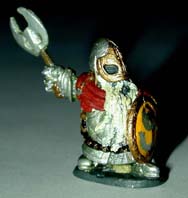
14.1 All Clerical and many False Gods have Their own elite Orders of Faithful Followers to further Their particular Creed and plans. The Militant Orders are known as Paladinic Orders.
14.2 A Paladin is a Fighter who is also a Cleric of the God and has taken the vows of the Order. Their Paladin Level ("PlL") is the sum of their Fighter and Clerical Levels and admission as a Paladin they are typically Delegated Powers by the God, the Effects of which depend on PlL. Anti-Paladins are simply Paladins of Evil and/or Chaotic Gods.
14.3 The main Paladinic and other elite Orders of the Clerical Gods are (or were) as follows (knowledge of Secret Orders is Restricted):
| God | Order | Nature / Notes |
| ALTIS | Temple Guards | non-Paladinic Orders of Ft/Cls |
| BUDIF | The Paladins of BUDIF | Paladinic Order |
| CAERULAS | The Lightbringers | Paladinic Order |
| DALA | none | no organised Orders, but powerful Adventurers may form ad hoc groups |
| ESCUS | Berserkers | non-Paladinic Order of Ft/Cls |
| FIDAR | The Peacemakers / Crusaders for Truth | non-Paladinic Peaceful Order |
| HAERIM | The Red Scorpions | Schismatic Sect of former Anti-Paladinic Scorpion Cultists |
| KOROS | Karmic Monks / Nuns | Monastic Orders, including the Secret Heavenly Order of Karma Chameleons |
| LOFIR | LOFIR's Destroyers | Anti-Paladinic Order |
| MIRIMI | The Order of the Moonwalkers | Monastic Cults of Secret Thief / Assassin Monks and Nuns |
| OPSOR | The Warrior Priests of OPSOR | Paladinic Order |
| ORIL | The Warrior Priests of ORIL / Mist Warriors | Paladinic Order / Druidic Order |
| PAREL | The Order of Singing Paladins | Paladinic and Choral Order |
| RAYLIT | The Seekers of the Light | Paladinic Order |
| SARAN | The Paladinhood of SARAN | Paladinic Order |
| SHELDA | The Knights of the Rose | Paladinic Order |
| SOROK | The Army of the Undead | Secret army of the Undead Controlled by the Temples |
| TERRIK | Troublemakers | non-Paladinic Secret anarchic group |
| TIPRE | The Warriors of Fortune | Paladinic Order |
| WACON | The Paladins of WACON | Paladinic Order |
| WAGREN | The Hammers of WAGREN | Anti-Paladinic Order |
| ZAKEL | Warmongers | non-Paladinic anarchic group |
14.4 False Gods of Animals and Trees have Their Own Druidic and/or
Thievish Cults.
Go to standard Spell lists / Spell specifications
Back to top of document
Back to MU System index
Back to Systems index
© P.R. Wild, 1998-2025 / / Minifig paiinting and photographs © A.R. Magnay, 2025
3rd Edition 8 January 2025